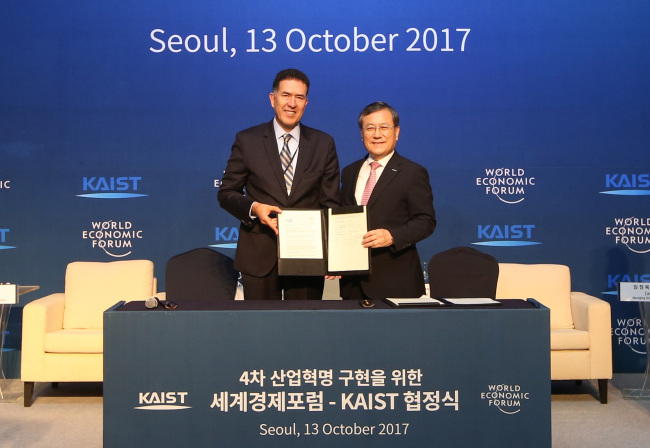KAIST partners with WEF for ‘4th industrial revolution’ push
By Sohn Ji-youngPublished : Oct. 13, 2017 - 15:57
South Korea’s science and technology university KAIST has partnered with the World Economic Forum to help Korea and the global community prepare for the major changes and challenges expected to come from the “fourth industrial revolution.”
KAIST and WEF signed a memorandum of understanding in Seoul on Friday, agreeing to cooperate in researching issues such as anticipated major labor market shifts as industries adopt next-generation technologies like artificial intelligence.
It is the first formalized partnership that the WEF has sealed with an academic institution, according to the Switzerland-based international organization.
KAIST and WEF signed a memorandum of understanding in Seoul on Friday, agreeing to cooperate in researching issues such as anticipated major labor market shifts as industries adopt next-generation technologies like artificial intelligence.
It is the first formalized partnership that the WEF has sealed with an academic institution, according to the Switzerland-based international organization.

The fourth industrial revolution is a term coined by the WEF’s Executive Chairman Klaus Schwab at the Davos summit in 2016, referring to a new, connected digital economy buttressed by technological breakthroughs in fields like AI, the Internet of Things, autonomous vehicles, robotics, big data computing and nanotechnology.
The WEF has since been taking the lead in devising governance models and strategies for better job creation and setting up a regulatory framework that can support the safe adoption of new tech innovations across countries.
Joining WEF’s efforts, KAIST will help WEF in compiling a Korea-specific version of the “Future of Jobs Report.” It will become the first country-specific version of WEF’s global job future forecast report, according to the international organization.
“To move forward the new age of the fourth industrial revolution, every country needs to devise the appropriate policies that are tailored to their specific markets. KAIST is looking to contribute to this process for Korea as well as the broader international community,” said KAIST President Shin Sung-chul.
In addition, the Daejeon-based university will send its research fellows to WEF’s Center for the Fourth Industrial Revolution in San Francisco, contributing to research and policymaking for new technologies like blockchain, IoT, AI, autonomous vehicles and precision medicine.
It will also leverage its technological leadership in areas like drones, big data, autonomous vehicles, and humanoid robots to support WEF’s initiatives in these areas, it said.
The KAIST-WEF memorandum was signed on the sidelines of a roundtable co-hosted by the two entities in Seoul on Friday. The event was organized with a focus on shaping Korea’s priorities for inclusive growth and job creation in the fourth industrial revolution.
Leaders from the government, businesses, universities and nonprofit civic organizations took part in the discussions, including the head of the WEF Center for the Fourth Industrial Revolution Murat Sonmez and KAIST President Shin Sung-chul, Doosan Group Vice Chairman Lee Hyun-soon as well as Korea Venture Business Association President Ahn Keon-Joon.
Topics explored during the one-day event included “Inclusive growth and the Fourth Industrial Revolution” as well as “Future Jobs,” “Creation of Innovation Ecosystems” and “SME 4.0 Initiative.”
By Sohn Ji-young (jys@heraldcorp.com)




![[Herald Interview] 'Amid aging population, Korea to invite more young professionals from overseas'](http://res.heraldm.com/phpwas/restmb_idxmake.php?idx=644&simg=/content/image/2024/04/24/20240424050844_0.jpg&u=20240424200058)












![[KH Explains] Korean shipbuilding stocks rally: Real growth or bubble?](http://res.heraldm.com/phpwas/restmb_idxmake.php?idx=652&simg=/content/image/2024/04/25/20240425050656_0.jpg&u=)

